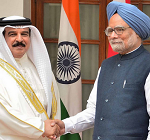High-level delegations from three countries – Saudi Arabia, Iran and Bahrain – are visiting India this month. It is not clear whether the visits coming together in the span of a few days, and at a time when India is gearing up for national elections, is by accident or design.
Various factors may explain the timing. The visitors from Saudi Arabia (February 26-28) and Iran (February 27-28) are coming to India after the two countries have had intensive talks with Pakistan and China. Pakistan has always had close strategic relations with Saudi Arabia; Iran recently hosted the Chairman of the Pakistani Senate and signed an MoU with China to increase annual non-oil trade to $20 billion.
The chronology highlights the importance India must give to these two visits. Especially since Saudi Arabia and Iran (apart from Iraq) are, and will remain, India’s largest sources of crude oil.
Saudi Crown Prince Salman bin Abdul Aziz Al Saud, and Iranian Foreign Minister Javad Zarif will probably carry messages on behalf of Pakistan, which is concerned about India’s profile in Afghanistan after the U.S. drawdown later this year. Both visitors are likely to urge India to improve bilateral ties with Pakistan.
The Delhi Declaration signed during Saudi Arabian King Abdulla bin Abdul Aziz’s landmark visit in 2006, followed by the Riyadh Declaration signed by Indian Prime Minister Manmohan Singh during his visit in 2010, form the basis of a sporadically evolving relationship between Saudi Arabia and India.
At the 10th session of the Saudi-India Joint Commission held in Riyadh in January 2014, the two sides discussed measures to promote Saudi investment in sectors such as infrastructure and petrochemicals, as well as set up a Saudi-India Investment Fund. Stronger cooperation in tackling organised crime, money laundering, and drug smuggling were the other important issues that were discussed.
Trade between the two countries is now at $43 billion; nearly 3 million Indians live and work in Saudi Arabia, and it is India’s largest supplier of crude. Given the possibility that U.S. oil production could surpass that of Saudi Arabia in the next five years, Saudi Arabia is acutely aware of the Indian market, and of competition from Iraq and Iran.
Its goal will be to consolidate ties with India through investments in industry and guaranteed oil supplies. Yet to be finalised, however, is the proposal for a Free Trade Agreement between India and the Gulf Cooperation Council (GCC), which is India’s third largest trading partner.
The focus of Iranian Foreign Minister Zarif’s visit is also likely to be on energy and the economy. Iran has asked India to repay half of its outstanding debt of nearly $3 billion for oil supplies, now that sanctions have eased. With Iran and P5+1 continuing their talks on the nuclear issue, Iran will have greater latitude in its trade and oil exports to India, once the payment method is agreed upon. Also likely to be discussed is India’s delay in committing funds to the development of the Chabahar port for transit to Afghanistan and Central Asia. Any further delay by India’s part could lead to Iran accepting a standing offer from China.
Iran and India share common concerns on Afghanistan, mainly on whether a resurgent Taliban will overwhelm the Afghan National Security Forces after the U.S. drawdown. Given that India has projects valued at nearly $2 billion in Afghanistan, it will seek Iran’s cooperation in securing Indian investments on the ground and preventing an upsurge by India-focused Islamic groups nurtured by Pakistan.
Meanwhile, an ideological and religious cold war continues between Iran and Saudi Arabia; the two countries also have opposing positions on the civil war in Syria. On the issue of Syria, India has tried to reach a middle ground in an increasingly polarised war. With no progress in the recent Geneva-II talks, there are reports that regional powers like Saudi Arabia, Qatar and Turkey, along with the U.S., are veering towards providing heavy military equipment to “approved”’ Syrian opposition groups, even if they end up in al-Qaeda hands. India will do well to advise the Saudi visitors against this course, because the impact will be felt across South Asia.
Last week, Bahrain came to India looking to enhance its status as an economic hub in the Gulf – as a diversified economy, only 19% of its GDP comes from oil. Given its umbilical relationship with Saudi Arabia, and the presence of 3.5 lakh Indian nationals, it serves Bahrain well to keep India entrenched in its economy.
It was the first visit of Bahrain’s King Hamad bin Isa Al Khalifa to India, and the bonhomie on display was remarkable. A new agreement on avoiding double taxation is on the cards and can become an entry point for Bahrain’s investment in India. The decision to raise the Joint Economic Forum to the ministerial level has set the tone for future interactions between the two countries.
All three visits will impact India’s vital interests in the Gulf. It is important for India to take their outcomes forward. Considering that the outcome of the elections in India remains uncertain, the present government would do well to consult, and involve, other major political parties.
Rajendra Abhyankar former Secretary, Ministry of External Affairs, teaches at the School of Public and Environmental Affairs, Indiana University, Bloomington, U.S.
This article was exclusively written for Gateway House: Indian Council on Global Relations. You can read more exclusive content here.
For interview requests with the author, or for permission to republish, please contact outreach@gatewayhouse.in.
© Copyright 2014 Gateway House: Indian Council on Global Relations. All rights reserved. Any unauthorized copying or reproduction is strictly prohibited.


